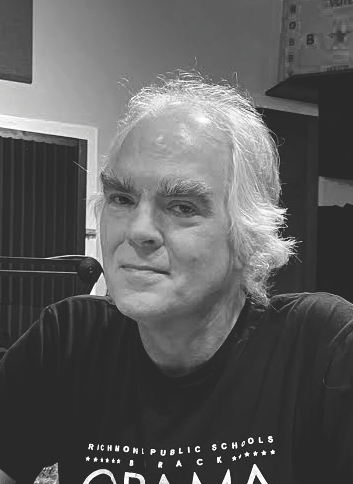With Hazy Moods, DJ Harrison reveals his perfect pitch.

Good luck keeping up with the ever-changing, shape-shifting musical career of Devonne Harris.
“I want to push boundaries within myself to see if I can do everything.”
Some have likened the 29-year-old Harris (only half-jokingly) to Prince. Producer, solo artist, DJ, engineer, songwriter, multi-instrumentalist, sideman—the Petersburg native wears many hats, and has been a prime mover in Virginia’s jazz and hip-hop scenes for years while dabbling in blues, rock and other styles. Now the world is noticing.
Harris—aka DJ Harrison— had his solo debut Hazy Moods released earlier this summer by the Los Angeles-based Stones Throw label, winning raves and establishing him as a hip-hop beat master. “I put my music out for myself,” he says of the disc, which features solo recordings of tracks from years of home tapes. “While I’m doing it for myself, I’m also trying to honor all of the people I’ve played with that I’ve learned from.” That’s a long list. It includes everyone from QuestLove and the Roots to blues legend Sherman Holmes and the guys in his own group, Butcher Brown. Harris has become a fixture in the house band for Richmond’s Spacebomb label (Matthew E. White, Natalie Prass) while also establishing his own label, Jellowstone.
He won his chops by playing with seasoned Virginia jazz players like John D’Earth and Marcus Tenney. “I came up playing music as a sideman, so I really try to hone in on what artists want,” he says. “I just try to make sure they get their vision down as clearly as they want it.”

For this busy creative, it all started with the records that his dad, Magic 99 disc jockey Lovander Shelton Jr., left behind. Songs that entranced him, by the likes of Earth Wind and Fire, Herbie Hancock, fellow Richmonder D’Angelo and—“obviously”—Marvin Gaye.
“Once my parents split up, it was me and my mom,” he says. “She kind of nurtured my love of music, she bought me toy drums and toy instruments from an early age.” Mother Lorraine moved the pair to Chester when he was nine. She also answered her son’s questions about records and how they’re made. “She explained there is a band, and people play in it, and they record in a studio. I wanted to know how does it work, how is it made? So I figured out, one by one, what a producer does, a songwriter, an engineer, right on down. Then I saw some concerts on MTV and figured out how all that was done.”
At the same time he was tinkering with home cassette recorders, he was also learning music theory at Thomas Dale High School, playing drums and percussion. He found out by being in the school band that there wasn’t anything he couldn’t pick up and play—clarinet, trumpet, trombone, euphonium, even the tuba. His teachers soon found out that he had perfect pitch. When he got his driver’s license, he began frequenting the clubs around Virginia Commonwealth University, often performing underage with older jazz players. He eventually attended VCU and graduated from its jazz studies program as a star pupil.
It’s interesting that, with all of the great musicians on call, his solo debut, Hazy Moods, is all Devonne, and mostly consists of archival material from his vaults (not unlike the much-cherished cassettes he has issued locally to fans, or his popular SoundCloud posts). “I have tons of old recordings … I never let anything go to waste. But most of the Hazy Moods album was recorded live. It’s just having multiple options to create. You never want to limit yourself. Here, I’m recycling myself,sampling myself.”
Harris’ Jellowstone Studios—also his Richmond home—has become the regional it-house for players and musicians from across the genres, from jazz trumpeter Nicolas Peyton to bluegrass group Dalton Dash. It’s also where he collaborates with soul singer Kelli Strawbridge on the KINGS project, and records Butcher Brown and performers for his label, which he started with No BS! Brass Band trombonist Reggie Pace. “There’s a lot of low-end microphones and vintage instruments,” he says of the cluttered, active studio with a drum kit in the living room. “To me, growing up, that’s what music was and to me it still applies, with all of the tape hiss and record crackle. It’s how the people I look up to recorded, on tape with real instruments.”
Devonne Harris has a bright future, but also a real reverence for the past.
“To look into the future, you have to know what happened in the past,” he says. “That’s how you learn, and that’s how you make things better.” DevonneHarris.com
Click here to read our feature on the full history of jazz in Virginia: meet the artists, read profiles and watch performance videos and interviews.









